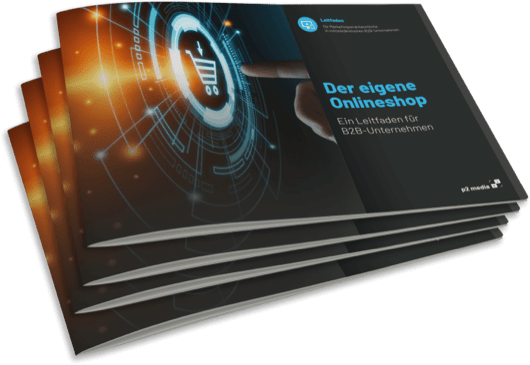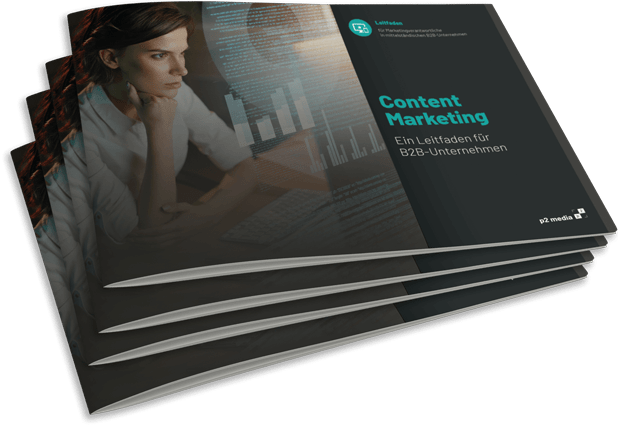B2C target groups have been informing themselves and buying preferably online in many situations for years. The fact that goods and also services that are wanted or needed, or corresponding facts can be found on the net, has long been part of the expectations of this buyer group.
Such a development is also increasingly evident in the B2B sector. Here, too, various online channels are increasingly being used for procurement. According to ECC Cologne, around a quarter of business customers already use manufacturers' or retailers' websites to obtain information about products in advance. Websites that enable visitors to make direct online purchases are the preferred choice.
The mere fact that (potential) customers - both B2C and B2B - are increasingly supporting their purchasing decisions online leaves no doubt that nowadays even SMEs (small and medium-sized enterprises) have no way around their own website.
In fact, it is particularly advantageous for small to medium-sized companies to be highly visible online. As a rule, they do not have the same degree of recognition as larger corporations.
A good website offers the best chances to attract attention, to reach new visitors, i.e. potential customers, as well as business partners and - maybe even internationally - to open up new markets with comparatively little effort.
But what does a good website for SMEs look like and what makes a good website? You will find the answers below.
Website Checkliste:
Diese Komponenten gehören zum perfekten Internetauftritt für Unternehmen
The optimal structure of a website for companies or SMEs is of course always context-dependent. That is, special requirements need specific features.
However, the following factors are always to be considered for a perfect website.
The design of your website is much more than a mere composition of colors, shapes, fonts and features.
Ideally, it reflects the values and visions of your brand. It allows visitors to immediately associate your brand with your industry, makes a good, appropriate impression in this regard right away and offers identification points. If you succeed in creating such a web design, which also conveys a certain unique position compared to the competition, this can help your branding enormously.
In addition, your web design should be functional and precisely tailored to the expectations of your target group. All particularly important areas or functions should ideally be quickly and intuitively accessible as well as usable.
Not to forget: Today, your web design must also look and function optimally on portable devices alone due to the - also B2B - ever-increasing user base of mobile devices. A responsive web design is often the most appropriate solution here.
Both the usability and the mobile capability are not least highly SEO-relevant.
When (potential) customers are specifically looking for your business on the web, the home page is almost always the first touchpoint with your brand. Even if they go to other pages first, visitors often go to the start page in addition to get an overview.
Accordingly, you should make your home page appealing, functional, and targeted according to the design and usability aspects mentioned above.
In addition, give your visitors at best a comprehensive overview of your brand with central performance information and all important USP (unique selling points) - always with a focus on customer needs.
Furthermore, make sure that viewers find many reasons on your homepage to look around in the areas of your website that are central to your business, to contact you, to buy directly or to complete other business-important conversions.
No matter what you offer - your portfolio should be provided centrally and be quickly comprehensible. Prospective and existing customers alike like to get a comprehensive picture of the companies they work with or buy from, especially in B2B. For you, there is also an increased chance that other of your services will also receive attention and perhaps be used. A hidden service page and lengthy texts about your offers are a no-go!
After all, your visitors are looking online for real added value, i.e. information or products that really help them to solve a specific problem or satisfy a specific wish. In addition, they usually have little time.
If you take this into account and present your portfolio in a target group-specific way, this can boost your sales considerably.
References can be provided - for example in the form of a description of implemented projects, the presentation of partnerships with well-known customers or simply the naming of individual partners for whom you are active as a supplier - in almost any company context.
You should definitely explore your options carefully and, if the opportunity presents itself, list the most impressive references possible on your website.
For one thing, these examples give (potential) clients very precise insights into your work. Perhaps they will even recognise their own requirements in a project you have already realised and will therefore rate your company as the optimal solution.
On the other hand, references also offer a very good opportunity to regularly put new content online - and that is again relevant for SEO.
Today, more than ever, (potential) customers want to know who they are dealing with before signing a deal. Especially in the B2B sector, large sums of money are often involved and long-term commitments are not uncommon. Under these conditions, you naturally don't want to cooperate with just any company. Accordingly, about-us pages on websites in the B2B sector are almost always closely scrutinized.
But also B2C (potential) customers are looking more and more closely. Fake shops, data theft and other criminal machinations on the net that are always in the media also lead to people increasingly informing themselves about the companies they might buy from.
If you present yourself authentically on the presentation page of your company, i.e. do not just play out flat advertising messages, show yourself to be close to the customer through direct contact options, among other things, and ideally signal personality - for example, through insights into your daily work - you significantly increase the chances that your services will actually be used.
For B2B SMEs, direct contact with (potential) partners is particularly important - not least because of the typical requirements in this business area mentioned at the beginning of the previous paragraph.
Ideally, you present yourself in a sociable and communicative manner even before the business deal is concluded. In this way, you signal to interested parties that they can always reach you quickly and easily as a partner, or that they can get help from you. This is a powerful selling point in both B2B and B2C.
This also increases the chance that interested parties will contact you during their customer journey, perhaps to receive further information. This will give you leads that you can very effectively guide towards a buying decision.
Providing your address, a phone number and an email address are, of course, absolutely standard. In many business areas today, however, something more must be offered in order to really convince the respective target group to contact you.
Direct communication options via live chat or video chat, social media and messenger are expected by more and more customers. So take a close look at how your target group prefers to communicate.
Through a blog, you can provide regular updates about your business, important industry news, or even tips on how to best use your products or other matters important to your buyers. At best, through such website content, you not only provide added value that helps your target audience solve specific problems or needs, but also gradually position yourself as an expert in your field. The benefits of being an expert probably need no further explanation.
This development is also supported by the fact that Google and Co. consider regular, value-added as well as accordingly probably much used content to be particularly relevant. This content thus tends to be ranked far in front. This brings you more reach, but also pushes your expert status: Namely, if you always appear prominently in the rankings of the majorsearch enginesin typical search contexts of your target group.
For websites used for business purposes, specific legal standards must always be observed in Germany. The provision of an imprint and the consideration of data protection regulations are the central factors here.
In any case, there must be a page with the title "Imprint" on which visitors can find all information according to Telemediengesetz § 5. This includes, among other things, the exact address, contact details, but also the VAT identification number and the legal form of your business.
The data protection guidelines are far more complicated. In general, you must explain any use of visitor data in a separate privacy policy. Furthermore, a notice on the use of cookies with differentiated consent options for your website users is required. Additional requirements result from the orientation of your business on the web. In any case, you should consult an appropriate legal expert.
8 criteria for a good website
In addition to the aforementioned generally particularly important factors and areas for building a website with the best potential for success, we would like to give you a quick overview below of how the quality of an Internet presence is centrally determined.
For more details on this, we recommend our articles What makes a good website?,The key success factors for a good website.
- High quality content: People today are primarily looking online for content that will really help them solve a specific problem or need. If you offer such content, your chances of closing deals increase greatly.
- SEO: Search engines, like google, are significantly often the starting point of any research on the web. Therefore, you should be in the best position there with your websites.
- Visual content: Images or infographics and videos are often particularly popular. Among other things, because they make it possible to convey even complex issues in a short time. Accordingly, such content tends to be very popular with visitors and can ultimately contribute significantly to pushing sales at various levels.
- User-friendly design, usability: Only if visitors can easily use your website, they will really engage intensively with its offers. The central resulting benefits have been outlined above.
- Short loading times: Fast loading pages are also an important factor for good usability. In addition, a good loading time is now highly relevant for SEO.
- Mobile optimisation: Your (potential) customers are also likely to use mobile devices more and more often and perhaps even prefer them for research on the web. This development alone illustrates perfectly how important it is that your website is mobile optimized.
- Analysis of the user journey: You should align all components of your website precisely to your target group and support them optimally at every point of the user journey. This means central advantages for you in online sales, branding and SEO.
- Professional Online Marketing: Your website offers a variety of options to effectively drive your customer acquisition and retention through online marketing. Use them as holistically as possible!
Optimal for small and medium-sized enterprises:
Das Baukastensystem WordPress
WordPress is not a classic construction kit, which enables end users to create a functional website without any expert knowledge. However, the content management system (CMS) offers numerous simplifications that allow even inexperienced users to do a lot themselves.
The CMS is very flexible. Here, even completely individual layouts can be uploaded as well as generally all conceivable web features implemented and finally managed by the operator without great expertise.
Exactly this end-user friendliness with high flexibility makes WordPress ideal for SMEs that can not / do not want to maintain a specialist department for website management and online marketing.
In addition, WordPress websites - especially since there are quickly configurable plugins for many typical and also more specialized functions - are relatively quick as well as inexpensive to create.
Create a company homepage:
One-Man-Show oder Agentur?
Now that it has been clarified what a good website for SMEs needs, the following question remains:
Who realizes an appropriate Internet presence for my company?
Basically, you have three options here:self-creation,freelancer oragency.
If you really want ideal conditions, you should definitely go for an agency. Because only here you benefit from the (wo)manpower as well as the know-how of numerous specialists - in strategy, controlling, web design, SEA, SEO, social media marketing and other important areas of online marketing.
Conclusion: This is what makes a good SME website!
SMEs need a website that can support their own business in a beneficial and sustainable way. More and more companies are recognizing this need.
In fact, however, only a few Internet presences of companies of this type prove to be really successful.
If you consider the factors presented in this article, you are on the right track.
Of course, we would also be happy to support you in creating the perfect website for your business context.
We are happy to support you in making your online presence competitive and future-oriented:
- How does your website compare to your strongest competitors? We would be happy to conduct a free TYPO3 upgrade check for you and define a success-oriented target alignment together with you.
- In this context, we will advise you with our extensive know-how on the topics of user experience and user guidance on your website and help you to deliver an optimal experience to your customers.
- Our experienced web developers will be happy to implement your individual wishes - be it the development of extensions, responsive websites, apps orinterface connections.
- Need a new website? No problem. Together we will find the right content management system for you and start from scratch.
- Our support team is always available for technical and editorial support as well as regular training.
For a successful and comprehensive online strategy, we are also happy to advise you on the following topics:
Oliver Parrizas will be happy to answer any questions you may have on the subject. +49-800-911-91-91













